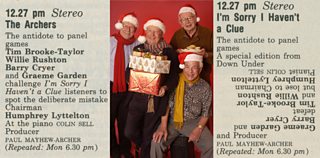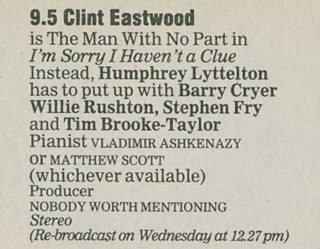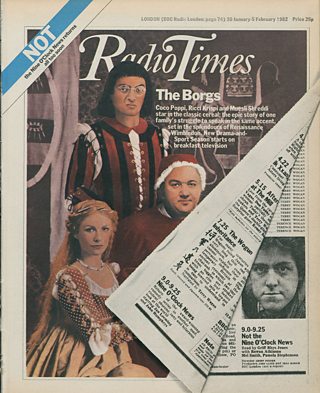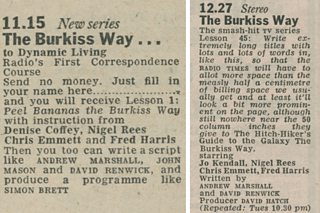
I'm Sorry I Haven't a Clue's Graeme Garden, Tim Brooke-Taylor, Barry Cryer and Humphrey Lyttleton, with a couple of their inventive listings...
Let's face it, Radio Times billings are supposed to tell you what a programme is about, who is in it, when it's on, and that kind of useful information. But sometimes, they veer off course...
Of course sometimes a programme is changed at the last minute, but by and large most listings describe what is going to be transmitted.
But once in a while, usually for comedic reasons, the billing has nothing to do with the programme - or it subverts the format and accepted customs. So for a bit of pre-festive frivolity in these difficult times, we're taking a brief look at some of the shows that have indulged in comedy listings over the years.
The first of our favourites accompanied the iconic - Radio 4's "antidote to panel games" which is still going strong, despite the sad deaths of some of its finest contributors: including former regular panellists Willie Rushton and Jeremy Hardy, legendary chairman and, earlier this year, founding-panellist Tim Brooke Taylor.

Another disappointment for dedicated 'Clue' listeners in this 1986 billing (the painfully modest producer was Paul Mayhew-Archer)
"Clue's" listings were always slightly off-centre, but by the 80s they went off the scale, often in affectionate mockery of the cast and producers. Sometimes the show's billings could be downright misleading as in some of these cases: giving fans of The Archers and Clint Eastwood opportunities to tune in to something guaranteed to disappoint! Other billings baffled Radio Times readers in other ways - by being upside down, having the words in the wrong order, or being in French...
"Clue"'s ancestor, I'm Sorry I'll Read That Again, while not indulging in the full-blown comic listing, was not above inserting references to not altogether real contributors, with the unholy presence of Angus Prune regularly credited (impersonated by Bill Oddie to sing the theme tune in the show itself), later joined by I.T. Briddock.

In 1982 Not the Nine O'Clock News parodied the previous autumn's Radio Times cover for historical drama The Borgias (photomontage by Michael Bennett, hand-tinting by Amanda Currey
was the product of a later generation of satirists, and was an amalgam of current affairs and comedy influences. As such there were two producers: , who had a news background, and , a graduate of the Cambridge Footlights, one-time flatmate of Douglas Adams and former �������� radio producer, who would go on to help create , and .
Plans for the programme got off to a bad start. The show was scheduled for the spring of 1979, but the announcement of a general election meant that the first two billed episodes were never shown, although some of the material was used in later episodes. Not the 9 O'Clock News eventually saw the light of day in the autumn of that year, and was quickly a cult success, if only with people who didn't want to watch the news...
Joke billings for the series soon began to appear in Radio Times and fans looked forward to seeing what the team would come up with next: as with I'm Sorry I Haven't a Clue, these ranged from the mildly misleading to the blatantly obscure: a title in Korean and a whole listing in Welsh. Their finest hour came with the Radio Times cover for the final series in 1982, parodying the previous autumn's cover for the lavish historical drama .

Burkiss Way performer Jo Kendall and sometime producer David Hatch were both part of the team of I'm Sorry I'll Read That Again, and also worked on early editions of "Clue"
Cult Radio 4 series , which ran from 1976 to 1980, is another of our favourites. It was the development of a short-lived Radio 3 comedy called , and its main writers David Renwick and Andrew Marshall also contributed to and . Their later work included (another show whose Radio Times listings subverted the genre) and each went on to create a successful TV sitcom (respectively and ), while Renwick also wrote .
Billings for the Burkiss Way played on the idea that the show was a correspondence course, in an era where adult education series were commonly found on the ��������. Each episode was described as a "lesson" in "The Burkiss Way to Dynamic Living", supposedly overseen by Professor Emil Burkiss, and played with the conventions of Radio Times, as well as the conceit of being able to pursue an actual course of learning...
Other spoof Radio Times billings we love include those for Victoria Wood's TV series: the synopses for editions of in 1985, and her of short comedy plays in 1989, had elaborate descriptions of programmes which bore no relation to the contents of the programmes themselves.
While there is, for the aficionado, a reassuring familiarity to the recurring tropes of the classic RT billing - and we could rhapsodise about those at length - we also can't help revelling in the mischievous delights of the spoof billing, and that feeling of inclusion in a dash of irreverence...
The spoof billing is a rare occurrence now - with the proliferation of channels there is little enough room for each programme's details in any listings magazine, and so none for the extravagant flights of fancy these whimsical entries involved. They're just another missing link to a bygone era, like fountain pens, ten bob notes and Spangles...
(If you've spotted any great comic billings in Radio Times, please post a link to your favourite examples below...)
